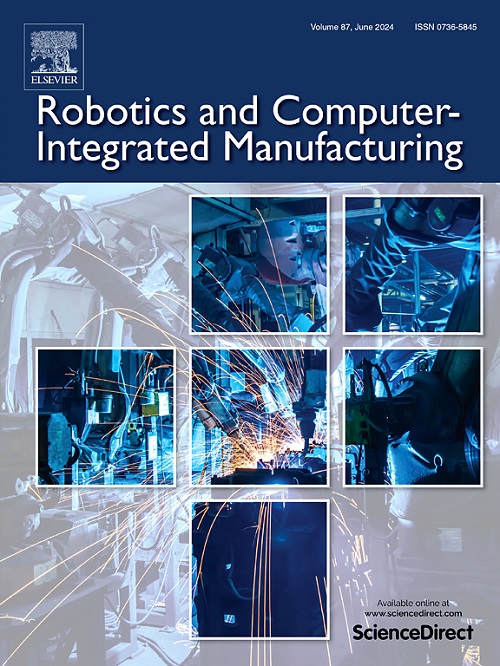基于数字孪生的深度q网络的不确定不可拆卸条件下机器人拆卸序列动态规划
IF 11.4
1区 计算机科学
Q1 COMPUTER SCIENCE, INTERDISCIPLINARY APPLICATIONS
引用次数: 0
摘要
机器人拆卸作为报废产品回收的重要环节,可以降低人力成本,机器人拆卸顺序规划有助于提高效率。零件的不可拆卸状态是不确定的,在机器人拆卸过程中必须识别。这种不确定性导致预先规划法生成的最优拆卸解不适用,不可能考虑精确的拆卸前不可拆卸条件。针对不确定不可拆卸条件下的机器人拆卸序列动态规划问题,利用数字孪生模型和深度q网络,根据识别出的不可拆卸条件动态生成最优解。首先,提出了数字孪生框架,建立了机器人拆卸过程的数字孪生模型。其次,利用决斗深度q网络来解决所提出的问题。以摄像机和齿轮泵为例,验证了该方法的有效性。实验分析包括连接测试、数字孪生的误差评估和算法在不同场景下的性能评估。结果表明,与其他算法相比,所训练的模型能在合理的时间内动态生成适合识别的不可拆卸条件的更好的拆卸序列。本文章由计算机程序翻译,如有差异,请以英文原文为准。
Robotic disassembly sequence dynamic planning under uncertain irremovable condition using dueling deep Q-network based on digital twin
As an important step in recycling the end-of-life products, robotic disassembly can reduce human labor costs and robotic disassembly sequence planning helps to improve efficiency. The irremovable condition of components is uncertain and must be recognized during the robotic disassembly process. This uncertainty leads to the inapplicability of the optimal disassembly solution generated by pre-planning method, which impossibly considers the accurate irremovable condition prior to disassembly. To address the robotic disassembly sequence dynamic planning problem under the uncertain irremovable condition, this paper leverages a digital twin model and a dueling deep-Q network to dynamically generate the optimal solutions according to the recognized irremovable condition. First, a digital twin framework is proposed and the digital twin of the robotic disassembly process is built. Next, a dueling deep-Q network is utilized to solve the proposed problem. Case studies on a camera and a gear pump are conducted to validate the proposed method. Experimental analyses include the connection tests, the error assessments of the digital twin, and the performance evaluations of the algorithm under different scenarios. Results demonstrate that the trained model dynamically generates superior disassembly sequences tailored to the recognized irremovable condition within a reasonable time compared with the other algorithms.
求助全文
通过发布文献求助,成功后即可免费获取论文全文。
去求助
来源期刊
CiteScore
24.10
自引率
13.50%
发文量
160
审稿时长
50 days
期刊介绍:
The journal, Robotics and Computer-Integrated Manufacturing, focuses on sharing research applications that contribute to the development of new or enhanced robotics, manufacturing technologies, and innovative manufacturing strategies that are relevant to industry. Papers that combine theory and experimental validation are preferred, while review papers on current robotics and manufacturing issues are also considered. However, papers on traditional machining processes, modeling and simulation, supply chain management, and resource optimization are generally not within the scope of the journal, as there are more appropriate journals for these topics. Similarly, papers that are overly theoretical or mathematical will be directed to other suitable journals. The journal welcomes original papers in areas such as industrial robotics, human-robot collaboration in manufacturing, cloud-based manufacturing, cyber-physical production systems, big data analytics in manufacturing, smart mechatronics, machine learning, adaptive and sustainable manufacturing, and other fields involving unique manufacturing technologies.

 求助内容:
求助内容: 应助结果提醒方式:
应助结果提醒方式:


